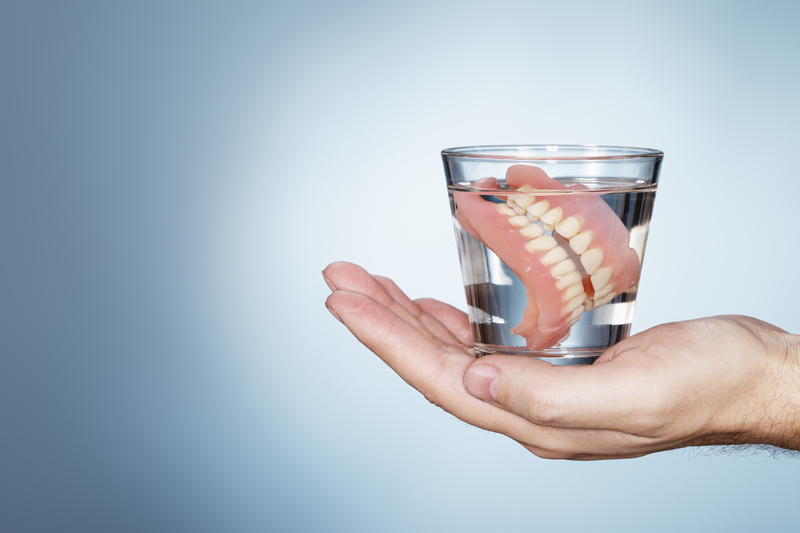How Dentures Improve Oral Health

Millions of people across the U.S. are missing teeth, and many of them struggle with chewing, eating and speaking because of it. Without the support of the teeth in our mouths, our faces can actually shift, making us look older than we actually are and increasing our likelihood of malnutrition and trauma to other teeth. Dentures are an effective way to combat the effects of missing teeth, and there are many options to choose from to fit your needs and wants. Whether you’re missing all of your teeth or just a few, partial and full dentures can restore mouth functionality and your confidence. Find out what to expect when getting fitted for dentures and how they can improve your oral health with this guide!
How Missing Teeth Affect Oral Health
Our smiles are one of the first things that people see, but many people across the U.S. are self-conscious about their smile due to missing teeth. While missing teeth create an eye sore, they also can hurt our oral health. When teeth are missing, you’re more likely to struggle with chewing and eating your food. If you can’t eat certain foods due to your missing teeth, you miss out on important nutrients that your body needs to stay healthy and put yourself at risk for malnutrition. Additionally, missing teeth can change your facial appearance. Teeth fill out the appearance of your face, but without them, your facial muscles can sag and make you look older. You might even notice that you speak differently without some of your teeth, which can be embarrassing for you and create difficulties as you try communicating with other people. Holes in the mouth can also cause other teeth to shift into their place, causing malocclusion and stress on adjacent teeth.
Teeth can fall out due to old age, trauma or disease, leaving your mouth susceptible to any of the aforementioned problems. Any of these situations can affect your self-confidence and ability to eat, chew and speak. However, there is hope for patients who have lost their teeth. Dentures have improved the smiles of millions of people and helped them go about their daily activities with ease. While there are different types of dentures available, you can choose any of the following to fit your needs and wants.
Types of Dentures
Dentures are appliances that fit to your gums snugly and replace the missing teeth in your mouth that are causing you problems. Partial and full dentures are the two main types of dentures that dental patients use, each of which perform different functions. Partial dentures replace one or more missing teeth and are attached to remaining teeth to close the gap that missing teeth have caused. Clasps are attached to these teeth to hold the partial in place so that you can eat and speak normally. Full dentures replace an entire row of teeth, whether on the top or bottom, and are classified as either immediate or conventional. Immediate dentures are placed in the mouth immediately after teeth have been removed. This type is popular because you never have to go without your teeth but it will need to be relined several times as the bone reshapes during the healing process. Conventional dentures are placed in the mouth after the teeth are removed and the tissue has completely healed, which can take months. The downside to conventional dentures is that you can be without teeth for weeks or months, depending on how fast your mouth heals. However, once placed, conventional dentures work just as well as immediate dentures and no one will know the difference. Lastly, you can opt for implant-secured dentures that are held in place by dental implants to keep your denture secure. These types of dentures are preferred over others because they protect adjacent teeth, prevent slippage of the denture itself and improve your ability to bite and chew.
Caring For Your Dentures

Just like natural teeth, dentures need to be taken care of if you want them to last. They should be rinsed daily to remove any food that may be stuck in them and scrubbed with a soft-bristled toothbrush to prevent scratching. Even though your dentures can’t decay, they can still hold decay-causing bacteria that clings to them from food. If you aren’t cleaning them properly, that bacteria can spread to other natural teeth that you still have and cause issues. Not only will cleaning them protect you from plaque but it will also keep your dentures from becoming stained. When you’re not wearing your dentures, make sure to put them in a denture cleanser soaking solution or water to keep them from drying out. Never put them in hot water because this can cause them to warp and not fit your mouth anymore.
If your dentures break, crack or don’t fit anymore, contact your dentist to schedule an appointment. Bring your dentures to the appointment with you so that he/she can examine them. If the damage is severe, you will most likely be fitted for new dentures. Even if you think you can adjust them without causing damage, don’t do it yourself; always meet with your dentist if any problems arise.
Improve Your Smile With Our Help!
If you have missing teeth and are interested in dentures, call Dr. Evanson at (720) 409-0008 to schedule a consultation. Your oral health is of utmost importance to us and we want to help you improve your self-confidence and get your smile back. Call our office today to begin your journey towards a healthier, prettier smile!






